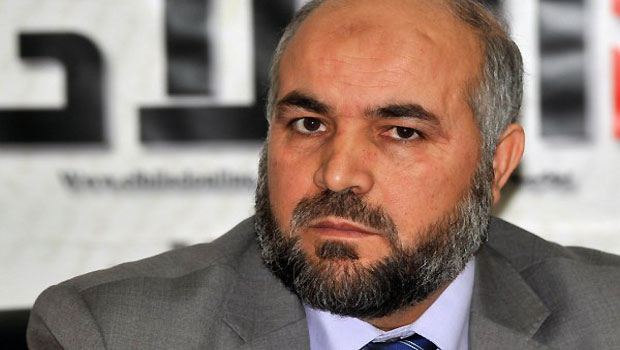
File photo of head of the Algerian branch of the Islamic Ennahda Movement, Fatah Rabiai. (AAA)
Algiers, Asharq Al-Awsat—“The more pressure you exert [on the government], the more rights you will secure” a senior Algerian Islamist told Asharq Al-Awsat.
The head of the Algerian branch of the Islamic Ennahda Movement, Fatah Rabiai, emphasized that the urgent action being taken by the government to employ youth in the south of the country, in order to address the growing anger in the region, is “nothing more than a cosmetic measure” stressing that “employment policy in Algeria is based on loyalty not efficiency, experience, and equal opportunities for all Algerians.”
Speaking exclusively to Asharq Al-Awsat, Rabiai claimed that the protests in the south are due to the southerners feeling discriminated against with regards to the distribution of oil revenue, adding that the Algiers government does not possess a “comprehensive vision” regarding national employment and development.
He said: “We have always depended on the proceeds of oil and there are no serious steps being taken towards establishing a productive economy.”
He added that “so long as financial and administrative corruption and political and social tension are the norm, such events will continue to break out” referring to the protests that have taken place across the country.
Teachers, students, doctors, postal workers, and public administrators have gone on strike for better working conditions and wage hikes in recent weeks. In addition to this, huge protests have taken place across the country including in the capital Algiers and the oil-producing Warqala region in the south. Estimates of the unofficial rate of urban unemployment in Algeria are as high as 20 percent, while joblessness in central and southern Algeria is reputedly closer to 30 percent.
Rabiai told Asharq Al-Awsat: “The different crises that Algeria has passed through, and the manner in which the authorities dealt with these events, usually ended with the promotion of unenforceable slogans. These end with tearful speeches, claims of foreign conspiracy, and buying social peace by injecting [oil] revenues into the country. Ultimately this does not benefit society and only serves to increase tensions.”
As for why the Algerian authorities only attempt to resolve social problems, like unemployment, when this has reached a tipping point, he said: “In my view the reason is very simple, the government does not have a clear vision or program to solve these problems before they occur, therefore we only ever see their reactions to this.”
Rabiai asserted that “the government today is devoted to the traditional view that the more pressure you exert the more rights you will secure, so now instead of dialogue we have the disruption of traffic and occasionally violent protests. In the eyes of the citizens, this has become the only means of achieving demands.”
Prime Minister Abdelmalek Sellal is scheduled to visit southern Algeria today to put forward his program to employ southern youth. However the head of the Algerian branch of the Ennahda Movement stressed that the social problems in southern Algeria, and the government’s response to these, represent a “crisis of legitimacy” for Algiers.
He added: “This represents the essence of the problems in Algeria. The source of all of our problems is political, for what is built on illegitimacy is illegitimate. Weak institutions devoid of legitimacy and credibility cannot address the challenges and concerns of the people.”
Rabiai also emphasized that “if we want stability and social peace we must look once again at political reform via serious discussion away from partial solutions.”
He called for a consensual constitution that determines the nature of the political regime in line with international standards, in addition to a review of the political parties and election laws. He also demanded legislative and local elections, to be followed by presidential elections, along with the introduction of realistic economic, social, and educational policies compatible with Algeria’s political culture.
